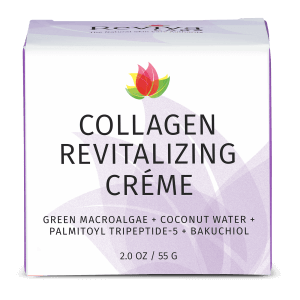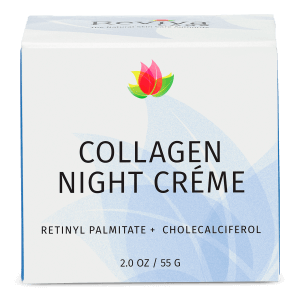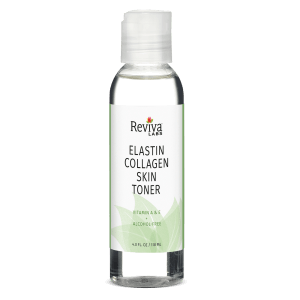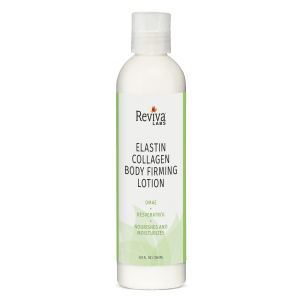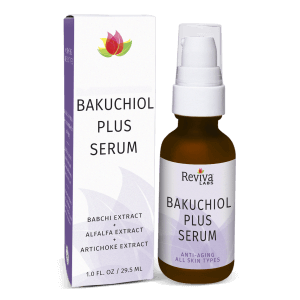Ingredients, Reviva Labs, Skin Care
Will Collagen Peptides Tighten Skin?
Collagen peptides have garnered significant attention in recent years for their potential benefits in skin health, particularly in tightening and firming the skin. As we age, our skin naturally loses collagen, leading to sagging, wrinkles, and a loss of elasticity. Collagen peptides, which are derived from collagen through a process of hydrolysis, are believed to help counteract these effects by providing the body with the building blocks it needs to produce more collagen.
Collagen is the most abundant protein in the human body, making up about 75% of our skin’s dry weight. It is a critical component of the dermis, the layer of skin that gives it structure and firmness. As we age, collagen production slows down, and existing collagen fibers break down, contributing to the visible signs of aging. This has led to an increased interest in collagen supplements, including collagen peptides, as a means to restore and maintain youthful skin.
How Collagen Peptides Work
When ingested, collagen peptides are broken down into amino acids, which are then absorbed into the bloodstream. These amino acids are used by the body to synthesize new collagen fibers in the skin and other tissues. Some studies suggest that collagen peptides may stimulate the skin’s metabolism and counteract the loss of collagen from aging and environmental factors such as UV radiation and pollution.
Research has shown that collagen peptides can improve skin elasticity, hydration, and overall appearance. A study published in the Journal of Cosmetic Dermatology found that women who consumed collagen peptides daily for eight weeks experienced a significant improvement in skin elasticity compared to a placebo group. The researchers concluded that collagen peptides could be an effective supplement for improving skin health.
Scientific Evidence Supporting Collagen Peptides
The scientific community has been actively investigating the benefits of collagen peptides. One notable study published in Skin Pharmacology and Physiology found that participants who took a collagen peptide supplement for 12 weeks experienced a 20% reduction in wrinkle depth around their eyes. Additionally, the study observed an increase in skin hydration levels and collagen density in the dermis, suggesting that collagen peptides can enhance the skin’s structural integrity.
Another study conducted by the Department of Dermatology at the University of Kiel in Germany reported that oral supplementation with collagen peptides significantly increased skin hydration and reduced fragmentation of the dermal collagen network. These findings support the hypothesis that collagen peptides can help maintain skin health by improving hydration and reinforcing the skin’s structure.
Collagen Peptides and Skin Tightening
The primary question for many people is whether collagen peptides can truly tighten the skin. The evidence suggests that they can, but it is important to understand the mechanisms behind this effect. Collagen peptides work by stimulating the production of new collagen fibers, which can help to firm up the skin and improve its elasticity. This process can take time, as the body needs to produce and incorporate new collagen into the skin’s existing structure.
Moreover, collagen peptides may help to improve the skin’s overall health by providing it with essential nutrients that support the skin’s natural repair processes. This can result in a smoother, more youthful appearance, with fewer wrinkles and sagging areas. However, the effectiveness of collagen peptides can vary depending on factors such as age, genetics, and lifestyle habits.
Factors Affecting Collagen Peptide Efficacy
While collagen peptides have shown promise in clinical studies, their effectiveness can be influenced by several factors. Age is a significant determinant, as older individuals tend to have a slower rate of collagen production. Genetics also play a role, as some people may naturally produce more collagen than others. Lifestyle choices, such as diet, exercise, and skincare routine, can also impact the efficacy of collagen peptides.
For instance, a diet rich in vitamins and minerals that support collagen production, such as vitamin C and zinc, can enhance the benefits of collagen peptides. Regular exercise can improve blood circulation, ensuring that nutrients are effectively delivered to the skin. Additionally, using skincare products that support collagen synthesis can complement the effects of collagen peptide supplements.
Choosing the Right Collagen Peptide Supplement
When selecting a collagen peptide supplement, it is important to consider the source and quality of the product. Collagen peptides can be derived from various sources, including bovine, porcine, and marine collagen. Marine collagen is often favored for its high bioavailability, meaning it is more easily absorbed by the body. Additionally, choosing a supplement that is hydrolyzed, or broken down into smaller peptides, can enhance its absorption and effectiveness.
Consumers should also look for products that are free from artificial additives and preservatives. Opting for a reputable brand that provides transparency about their sourcing and manufacturing processes can help ensure that you are getting a high-quality supplement. It is also advisable to consult with a healthcare professional before starting any new supplement regimen, particularly if you have any underlying health conditions.
Practical Tips for Incorporating Collagen Peptides
Incorporating collagen peptides into your daily routine can be simple and convenient. Many supplements come in powder form, which can be easily mixed into beverages such as coffee, smoothies, or even water. There are also capsules and liquid forms available, providing options to suit different preferences.
For optimal results, it is recommended to take collagen peptides consistently, as part of a balanced diet and healthy lifestyle. Combining collagen supplementation with a skincare routine that includes moisturizing and sun protection can further enhance the benefits. Drinking plenty of water and maintaining a healthy diet rich in antioxidants can also support the skin’s natural repair processes and overall health.
Real-World Testimonials
Many individuals who have incorporated collagen peptides into their routines report positive changes in their skin’s appearance. Testimonials often highlight improvements in skin texture, hydration, and a reduction in the appearance of fine lines and wrinkles. These anecdotal accounts align with the findings of clinical studies, suggesting that collagen peptides can indeed contribute to healthier, more youthful-looking skin.
For example, a user might share that after three months of taking collagen peptides daily, they noticed their skin felt firmer and more supple. Another might report that their complexion appeared more radiant and that they received compliments on their youthful appearance. These real-world experiences can provide additional motivation for those considering collagen peptide supplements.
Understanding Collagen Peptides
Collagen peptides have emerged as a promising option for those looking to improve their skin health and achieve a tighter, more youthful appearance. Scientific research supports the benefits of collagen peptides in enhancing skin elasticity, hydration, and overall structure. While individual results may vary, the evidence suggests that consistent use of high-quality collagen peptide supplements can contribute to firmer, more resilient skin.
For those interested in trying collagen peptides, it is important to choose a reputable product and incorporate it into a holistic approach to skincare that includes a balanced diet, regular exercise, and effective skincare practices. By doing so, you can support your skin’s natural ability to repair and rejuvenate, helping you maintain a youthful, radiant complexion.







